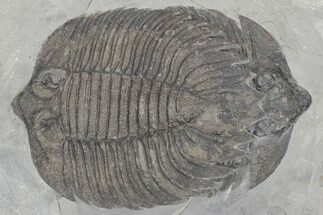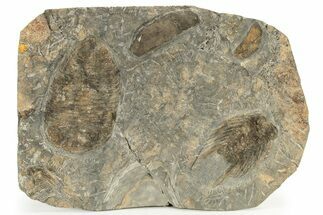.40" Pyritized Triarthrus Trilobite With Appendages - New York
The localities that preserve trilobites with soft-bodied preservation can probably be counted on one hand. One of these localities is where this specimen is from, the historic Beecher's trilobite beds in the Lorraine Group of New York. Less than a decade ago a new locality was discovered a short distance away that has produced amazing, soft-bodied preservation of trilobites and other organisms. Because of the rapid burial of the trilobites, in an anoxic environment, the soft body parts were replaced by pyrite, preserving details not typically seen.
This is a very detailed, laterally preserved specimen with legs and antennae. It measures approximately .40" and is located on a 3.4 x 2.6" piece of shale.
Included with your specimen is a printed copy of the cropped in photo seen above.
About Trilobites
Trilobites were a very diverse group of extinct marine arthropods. They first appeared in the fossil record in the Early Cambrian (521 million years ago) and went extinct during the Permian mass extinction (250 million years ago). They were one of the most successful of the early animals on our planet: over 25,000 species have been described, filling nearly every evolutionary niche. Due in large part to their hard exoskeletons (shells), they left an excellent fossil record.
Trilobites were a very diverse group of extinct marine arthropods. They first appeared in the fossil record in the Early Cambrian (521 million years ago) and went extinct during the Permian mass extinction (250 million years ago). They were one of the most successful of the early animals on our planet: over 25,000 species have been described, filling nearly every evolutionary niche. Due in large part to their hard exoskeletons (shells), they left an excellent fossil record.
$525
SPECIES
Triarthrus eatoni
AGE
LOCATION
Lewis County, New York
FORMATION
Frankfort Formation - Lorraine Group
SIZE
Trilobite .40" on 3.4 x 2.6" shale
CATEGORY
SUB CATEGORY
ITEM
#309859
We guarantee the authenticity of all of our specimens.
 Reviews
Reviews












